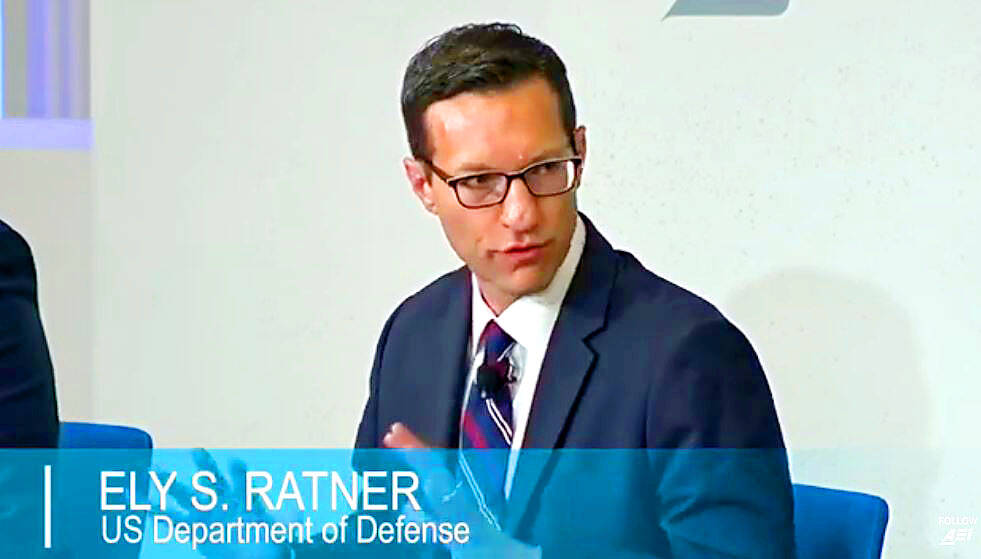Taiwan and the US are improving resilience and innovating operational concepts to maintain the capability to deter Beijing from attacking across the Taiwan Strait, a senior US defense official said on Wednesday.
Keeping Taiwan-US deterrence capabilities strong through improving bilateral cooperation has been a constant task for the US government, US Assistant Secretary of Defense for Indo-Pacific Security Affairs Ely Ratner told the American Enterprise Institute in Washington.
A war in the Taiwan Strait is not imminent or inevitable, he said, citing US Secretary of Defense Lloyd Austin.

Photo: screen grab from the American Enterprise Institute’s YouTube channel
Meanwhile, the Pentagon has made strides in developing a new concept of operations needed to overcome the unique operational challenges posed by the western Pacific region, Ratner said.
The US military is enhancing the dispersion, mobility, resilience and lethality of its forces in the region to deter China from acts of aggression, he said.
The global implications of maintaining peace and stability in the Taiwan Strait are underscored in private and public diplomatic interactions almost every day, he said, adding that more countries are emphasizing to the US the importance of this.
Taiwan can significantly boost deterrence by improving the resilience of its armed forces and society, Ratner said.
Efforts by the Taiwanese armed forces to enhance deterrence via refining operational planning, developing capabilities and conducting exercises have been heartening to the US, he said, adding that developments are positive across the board.
The consistent policy of the US is to maintain the “status quo” in the Taiwan Strait and oppose any unilateral attempts to change it, he said.
Ratner is a frequent contributor to the American Enterprise Institute and a policy veteran at the US Department of Defense.
Separately, US Assistant Secretary of State for East Asian and Pacific Affairs Daniel Kritenbrink told the event that US Secretary of State Antony Blinken is expected to emphasize Washington’s concern with Beijing’s escalating use of coercion against Taiwan.

The Central Election Commission has amended election and recall regulations to require elected office candidates to provide proof that they have no Chinese citizenship, a Cabinet report said. The commission on Oct. 29 last year revised the Measures for the Permission of Family-based Residence, Long-term Residence and Settlement of People from the Mainland Area in the Taiwan Area (大陸地區人民在台灣地區依親居留長期居留或定居許可辦法), the Executive Yuan said in a report it submitted to the legislature for review. The revision requires Chinese citizens applying for permanent residency to submit notarial documents showing that they have lost their Chinese household record and have renounced — or have never

A magnitude 5.6 earthquake struck off the coast of Yilan County at 12:37pm today, with clear shaking felt across much of northern Taiwan. There were no immediate reports of damage. The epicenter of the quake was 16.9km east-southeast of Yilan County Hall offshore at a depth of 66.8km, Central Weather Administration (CWA) data showed. The maximum intensity registered at a 4 in Yilan County’s Nanao Township (南澳) on Taiwan’s seven-tier scale. Other parts of Yilan, as well as certain areas of Hualien County, Taipei, New Taipei City, Taoyuan, Hsinchu County, Taichung and Miaoli County, recorded intensities of 3. Residents of Yilan County and Taipei received

Taiwan has secured another breakthrough in fruit exports, with jujubes, dragon fruit and lychees approved for shipment to the EU, the Ministry of Agriculture said yesterday. The Animal and Plant Health Inspection Agency on Thursday received formal notification of the approval from the EU, the ministry said, adding that the decision was expected to expand Taiwanese fruit producers’ access to high-end European markets. Taiwan exported 126 tonnes of lychees last year, valued at US$1.48 million, with Japan accounting for 102 tonnes. Other export destinations included New Zealand, Hong Kong, the US and Australia, ministry data showed. Jujube exports totaled 103 tonnes, valued at

BIG SPENDERS: Foreign investors bought the most Taiwan equities since 2005, signaling confidence that an AI boom would continue to benefit chipmakers Taiwan Semiconductor Manufacturing Co’s (TSMC, 台積電) market capitalization swelled to US$2 trillion for the first time following a 4.25 percent rally in its American depositary receipts (ADR) overnight, putting the world’s biggest contract chipmaker sixth on the list of the world’s biggest companies by market capitalization, just behind Amazon.com Inc. The site CompaniesMarketcap.com ranked TSMC ahead of Saudi Aramco and Meta Platforms Inc. The Taiwanese company’s ADRs on Tuesday surged to US$385.75 on the New York Stock Exchange, as strong demand for artificial intelligence (AI) applications led to chip supply constraints and boost revenue growth to record-breaking levels. Each TSMC ADR represents